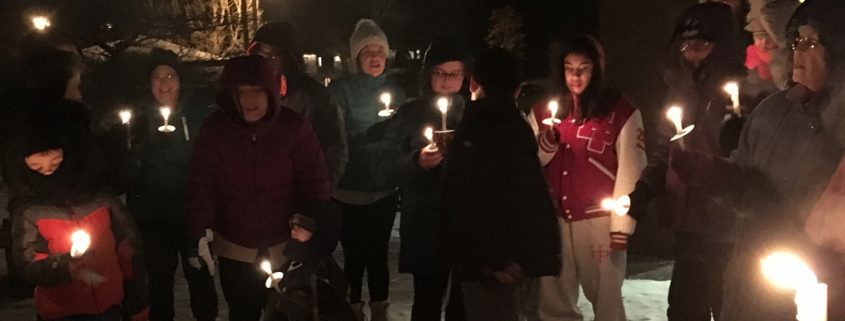Hope is subversive
(Isaiah 6-:1-6; Matthew 2:1-12) By Rev. Rick King—Last night, we celebrated the Feast of the Epiphany, which always happens on January 6, with a bonfire and hopes for the year ahead. Oh, and eating chili, too. Today is Epiphany Sunday, and the readings from Isaiah and Matthew are the same Epiphany readings every year—Isaiah’s promise that new hope is dawning after a long, dark time in Israel’s history, and the story of the Magi, the three kings, who ostensibly follow a star to worship the baby Jesus—but who end up foiling King Herod’s plot to find and eliminate him, and the threat he poses.
Empires like Herod’s are always threatened by hope. Despair, cynicism, and “settling” are what Empire needs to survive, and hope makes it hard for those to exist. As long as there was no hope of Israel returning to Jerusalem and rebuilding the temple, people would settle for a captive but comfortable life in Babylon, where there were beautiful Hanging Gardens (think “Seven Wonders of the Ancient World”), and they could make a tranquil, domestic life for themselves and their families, and not have to think about what they were missing without God, the Land, and lovingkindness.
Captivity—to whatever—always dulls us, and makes it easy, eventually, to settle for mediocrity. But hope is subversive; it eventually finds a way.
And the Magi? We love the story of “We Three Kings of Orient Are.” The lore that’s grown up around them reinforces their mysterious, exotic origins and their background as star-gazers, soothsayers, and diviners of wisdom, who nevertheless seek out a baby boy, born King of the Jews, illuminated by “What Star is This, that Burns So Bright?” as we heard the choir sing in the Introit.
The “light” imagery this morning is unmistakable, from the opening hymn, a riff off of Isaiah’s “Arise, shine, for your light has come, and the glory of the Lord has risen upon you,” to our final hymn, “We are Marching in the Light of God,” and from the lighting of the Christ Candle and switching our liturgical colors to white, to the fact that in the northern hemisphere, we’ve passed the winter solstice and the days are lengthening, the nights growing shorter. Signs of hope are all around us!
And the light imagery is there in the readings, as well, along with references to abundance, and joy, and symbolically significant gifts that the Magi bring. I know I called them “useless and priceless” on Christmas Eve, but the gifts are actually most appropriate for a boy-king who will become a dying-and-rising Savior later on in his life. Gold for a king, frankincense to burn as prayers are offered to a God, and myrrh which comes back to importance at the Crucifixion.
Epiphany answers the question, “What do you do after Christmas?” by shouting at the top of its lungs, “Make Jesus real!!” Because, as we heard in the gospel lesson last week, Jesus doesn’t stay a baby—he grows up! And Epiphany gives our faith a chance to grow up, too. It’s no mistake that the rest of Matthew’s story to accompany the Three Kings is the Holy Family’s flight into Egypt to escape Herod’s murderous plans, and Herod’s rage at having those plans foiled. That rage gives rise to the horrific Slaughter of the Innocents, which is nothing less than mass infanticide by a paranoid ruler with absolute power to order it. The Magi are warned in a dream not to return to Herod, who wants them to tell him where Jesus is, NOT so Herod can “pay him homage,” as he says, but so he can tell his contract killers where to find the baby, and eliminate him.
There is much in the world around us that does NOT want the HOPE that was promised in Advent, fulfilled in the Christmas birth, and made real in Epiphany. In fact, the stronger our witness to hope, the harder evil tries to thwart hope. Whether it’s religion that anesthetizes people to accept injustice as “their lot in life,” or government of the rich, by the rich, and for the rich—Epiphany Hope subverts the plans of the powerful who would build empires on the backs of the poor, enslave and incarcerate black and brown people, and substitute personalistic salvation for the Reign of God.
Against the prevailing despair that makes us settle for less than justice, peace, and compassion for Jesus’ brothers and sisters, HOPE gives us the vision and the power to ask, and ACT, for MORE for the weak and voiceless.
That’s what it means to be Epiphany People. That is Subversive Hope. Amen.

